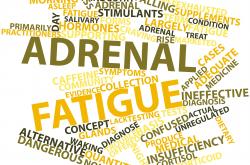The Many Causes of Adrenal Fatigue
Adrenal fatigue is a chronic syndrome that afflicts millions of people throughout the world. Learn about the root causes of adrenal fatigue, so you can develop a solid plan for recovery.
What is Adrenal Fatigue?
Adrenal fatigue is difficult to understand, since it is not a condition in the normal sense of that word. Instead, it is a combination of symptoms and signs that should more accurately be referred to as a syndrome. Because it is not the typical sort of medical condition that doctors are accustomed to diagnosing, it is often ignored by the medical community. Due to the failure to get a proper diagnosis, millions of people suffer neelessly.
At its core, adrenal fatigue is defined by an inability of adrenal glands to function at the level needed to manage the impact of everyday stress on the body. Due to the adrenals' crucial role in the stress response, any diminishing of their ability to function properly can wreak havoc on your entire body. Once adrenal fatigue sets in, the signs and symptoms can be dramatic.
Signs and Symptoms of Adrenal Fatigue
- Severe disruption in the sleep cycle
- Imbalances in the hormones
- Unexplained increase in belly fat
- Weight loss or weight gain, without changes in diet or activity
- Increased blood sugar
- Anorexia
- Lip discoloration
- Loss of muscle tone
- Extreme thirst
- Cravings for salt, sugar
- Loss of willpower
- Hair loss
- Loss of sex drive
- Yellowing, sagging skin
- Brain fog, memory loss, lack of focus
- Hyperactivity
- Exhaustion that isn’t alleviated by sleep
For more, read Signs and Symptoms of Adrenal Fatigue.
How Adrenal Fatigue Develops
To truly understand how adrenal fatigue impacts you, you need to take a look at how the adrenals become weakened over time. Even though stress is often named as the primary cause for this syndrome, that explanation only scratches the surface of the issue.
Your adrenal glands are correctly defined as the stress management centers of the body. Along with the thyroid, these two glands – about the size of walnuts – are little powerhouses that effectively keep the body running at full function even in times of duress. It is the adrenals, however, that bear the lion's share of responsibility for stress management. Not surprisingly, it is they that suffer the severest consequences when something goes wrong.
To learn more, read Understanding the 3 Distinct Stages of Adrenal Fatigue.
The HPA Axis
The HPA axis – which encompasses the interactions between the hypothalamus, the pituitary, and the adrenals – is critically important for the stress response. As such, understanding how it works is essential to comprehending the development of adrenal fatigue. Each of these areas of the body has a critical role to play in the process of dealing with stress.
The response to outside stressors begins with the hypothalamus in the brain. Upon recognizing that stressor, the hypothalamus releases corticotrophin-releasing hormone. That hormone then signals the pituitary gland to transmit another hormone, ACTH, to the adrenals. ACTH's arrival lets the adrenals know that they need to produce and release more cortisol. The extra cortisol that is released then primes the body for what is known as the »fight or flight« response: blood sugar levels rise, adrenaline is released, blood pressure and heart rate increase, and the muscles become supercharged with the energy they need to either deal with danger or run from it.
That process continues until the appropriate levels of cortisol have been amassed to enable the body to deal with whatever stressor had been identified. At that point, a series of negative feedback loops come into play to shut the whole process down. When the cortisol reaches a certain level, it actively works to prevent the hypothalamus and pituitary from summoning more hormones. That process is an amazing and complex system when it is working properly. When it becomes overused, however, the effects can be debilitating.
When the HPA Axis Becomes Dysregulated
Dysregulation of the normal activity of the HPA axis occurs when the adrenals are no longer able to meet the demands placed on them by the hypothalamus and pituitary. This generally happens as a response to abnormally high levels of stress over a prolonged period of time, but can be the result of other issues as well. After producing higher than normal levels of cortisol, the adrenals simply become too depleted to perform that function properly. This leads to an inability to properly manage stress, which then places additional pressure on the body's various systems and leads to an ever-increasing level of debilitating exhaustion.
At the same time, it is important to recognize that prolonged high levels of cortisol are damaging to the body in many ways. When there is no normal period of rest and recovery between those stress-related high levels of the hormone, cortisol disrupts many of the body's systems, floods the organs, inhibits the DHEA that your brain needs for normal function, and prevents the creation of other essential hormones such as progesterone and those related to sex.
For more, read A Closer Look at the Anatomy and Physiology of the Adrenal Glands.
Causes of Adrenal Fatigue
The actual causes of adrenal fatigue – those things that negatively impact the adrenal glands – are many and varied. Among them are stress, poor dietary habits, environmental toxins, medical issues, the use of corticosteroids, chemical imbalances, and an inability to obtain proper sleep or rest and relaxation.
The Effects of Stress
As we’ve already discussed, stress is the major contributing factor to this type of fatigue. That stress can be mental, emotional, or physical in nature, and can encompass a broad range of issues. Keep in mind, however, that the actual stressor is not the problem here. Instead, it is the way in which your body reacts to the stress that causes the overactive stress response and subsequent adrenal depletion. Common stress factors include mental and emotional concerns such as:
- Toxic relationships
- Financial hardships
- Work related stress
- Major life crises
- Stressful occupational lifestyles
- Feelings of helplessness
- Negative outlook on life
- Disorders such as anxiety and depression
- Personality traits (driven, ambitious, perfectionist, etc)
Of course, physical stressors can be as damaging as those emotional and mental issues. In fact, studies show that the body creates and releases up to ten times the usual amount of cortisol when it’s dealing with injury or illness.
- Chronic illnesses
- Injuries, surgeries, sunburns
- Chronic and ongoing pain
- Recurring infections
- Allergies and sensitivities
- Substance abuse and addiction
- Too much exercise, or too little
- Electromagnetic stress
- Stress from temperature extremes
The Effects of Poor Dietary Habits
In addition to those outside stressors, your adrenals can also be impacted by the dietary choices you make. For a variety of reasons, the modern diet can wreak havoc on the health of the body. Processing strips much of the nutrition away from many food products, leaving many people consuming little more than empty calories.
As a result of that depletion of nutrients, many people find themselves suffering from deficiencies in a variety of critical vitamins and minerals. Without that essential nutrition, it is impossible to maintain your organs healthy. It’s no wonder so many people succumb so quickly to adrenal fatigue when stress rears its ugly head – their bodies aren’t really healthy enough to have a fighting chance to stave off that exhaustion!
In addition to the loss of nutrients due to processing, and the reliance on processed foods in general, many people just have poor eating habits. They skip meals – and particularly breakfast – or they rely on sugar-laden choices that disrupt their normal energy levels. Many also tend to rely on caffeine, nicotine, or other stimulants to wake them up and keep them going throughout the day. Remember, your body needs proteins, carbohydrates, and fats to operate at peak efficiency. Ignoring any of those macronutrients can be a recipe for disaster.
Finally, the sheer volume of artificial substances used in modern foods is a continuing and growing problem. From artificial coloring and preservatives to pesticides, artificial hormones, and other additives, the modern food supply is so far removed from its natural state that most people have no idea what they are consuming on any given day.
The Effects of Toxins
Toxins are another major cause for weakened adrenals. By some estimates, the average person has hundreds of different toxic substances coursing through his or her body at any given moment. These toxic chemicals are everywhere in our environment, and can enter the body when we breathe or when we drink or eat. They include everything from pesticides and heavy metals that are common outdoors to the household cleaners that we use and even our dental fillings. Even your tap water contains potentially damaging chemicals that can create stress for your body and weaken your adrenal glands.
Medical Conditions That Affect the Adrenal Glands
There are many different medical conditions that can also negatively impact the adrenals as well. These include autoimmune diseases, cancer, AIDS, hypoglycemia, and tuberculosis. In addition, the adrenals can be damaged by infection, or disrupted by alterations in the normal function of the pituitary glands. It is important to understand how this happens.
Take autoimmune diseases, for example. When the immune system overreacts and has its white blood cells attack different areas of the body, it causes inflammation which triggers the release of cortisol. To counter the level of inflammation involved in an autoimmune condition, however, far more cortisol is needed than the adrenals can typically provide. That can lead to rapid depletion of the adrenal glands, and severe fatigue.
Hypoglycemia is another tricky situation for fatigue sufferers. In fact, the relationship between blood sugar levels in the hypoglycemic patient can be among the most challenging health issues facing those who suffer from adrenal fatigue. Because adrenal fatigue patients have such low levels of cortisol due to the depletion of their adrenal glands, they lack the ability to produce the cortisol the body needs to deal with low blood sugar problems. To make matters worse, those blood sugar levels can drop even further during times of increased stress.
In short, most medical conditions place added stress on the body that can cause the adrenal to work overtime. There are, however, some medical issues that simply overtax the adrenal glands, cause a massive influx of cortisol, and ultimately lead to adrenal fatigue. Patients who recognize how those conditions can impact their energy levels can work to address those issues.
The Effects of Corticosteroids
Corticosteroids are another factor that can add to adrenal stress. These substances are typically prescribed for management of inflammatory diseases. They work by mimicking the effects that cortisol has on the body and that is why they are also used in severe cases of adrenal fatigue.
The use of these substances is normally intended to supplement adrenal function for a time to allow the adrenals to properly recover from any damage. However, there are two problems associated with corticosteroids. First, their use can suppress normal adrenal activity, since the glands can simply atrophy from disuse. And even when that doesn’t happen, the adrenals can face unique challenges when the corticosteroid use is eventually discontinued.
The Effects of Chemical imbalances
Hormones, enzymes, neurotransmitters, and other chemicals in the body can also be at fault whenever they fall out of balance. A chemical imbalance can seriously disrupt glandular function by causing dysregulation of your body's essential rhythms. Whether it's serotonin, GABA, dopamine, histamine, epinephrine, or any of the hundreds of other bodily chemicals we have flowing within us, any imbalance can create the type of stress on the adrenals that leads to their depletion and exhaustion.
The Effects of Lack of Sleep
It should go without saying that sleep is a major issue in this type of fatigue. However, since many patients report what they perceive to be normal periods of sleep, there is obviously more to the rest factor than simply being unconscious for seven or eight hours each night. Proper sleep is essential! And yet proper sleep is often the one thing these patients never receive. You see, when cortisol rampages through the body, the natural circadian rhythm that helps to regulate the sleep-wake cycle can become disrupted. That causes the fine balance between cortisol and melatonin - the sleep hormone - to become dysregulated, which leads to abnormal levels of both.
That is also one of the reasons why adrenal fatigue patients often find themselves gaining energy late in the evening when their body should be releasing melatonin to prepare them for sleep, and then having difficulty waking up in the morning – a period when their cortisol levels should be near their peak. The dysregulation of those two hormones and the cycle that controls them causes the type of disruption that prevents restful sleep.
The Effects of a Lack of Relaxation
Because of the pace of modern life, many people fail to take the time to adequately rest and relax. In many areas of the world, relaxation time is at record lows as people are struggling to make ends meet and thus working more than they ever have. And even when they are not working, access to the twenty-four hour news, instantaneous communications, and heavy family scheduling can all limit the ability to actually tune everything out and rest. Over time, that all adds up to increased stress that can have you existing in a constant state of readiness – much to the detriment of your adrenals and your health.
For additional information about the causes of adrenal fatigue, read Lifestyle Factors Contributing To Adrenal Fatigue and Common Triggers of Adrenal Fatigue.
What Can You Do if You Think You Have Adrenal Fatigue?
Now that you know a little bit more about what can cause adrenal fatigue, the next step is to figure out how you can recover – and you can recover! It does take time, however, and a commitment to developing and implementing a sensible adrenal recovery program designed to heal your adrenals, manage your stress and other sources of fatigue, and then maintain your positive results over time.
Evaluate Your Condition
The first step toward recovery involves an evaluation of your condition. When you know you are fatigued, but can't quite determine what the cause could be, then it's time to obtain a diagnosis. Now, keep in mind that you may have some difficulty getting your doctor to provide a proper diagnosis, given that adrenal fatigue remains an obscure syndrome in their minds – and that's if they acknowledge it at all! There are two alternatives for you if your doctor is less than receptive to testing for adrenal function.
The first option involves home tests. There are three main tests involved: a pupil test to evaluate the contraction of your pupil, a blood pressure test that measures changing blood pressure levels when you rise from a lying position, and something known as Sargent's White Line – which simply involves using the blunt end of ballpoint pen to trace a line on the stomach. For more details about each, read about the Top 3 Home Tests for Adrenal Fatigue.
The second option involves laboratory exams. These tests can be performed by a physician, or can be ordered online and processed by an independent lab. They include the 24-Hour Urinary Cortisol Test, Blood Tests, ACTH Challenge Tests, and Saliva Hormone Testing. For a more in-depth review of each, read Laboratory Tests for Adrenal Fatigue.
Self Help Tips
There are some simple self-help tips that can help you as well. They include things like committing yourself to obtaining an accurate assessment of your condition, and tracking your daily energy levels in a journal. Exercise, sleep, dietary changes, and simple lifestyle improvements are all critical issues where we can all use a little self-help. To learn about these important suggestions, read How to Approach Adrenal Malfunction: 10 Quick Self Help Tips for Fatigue Sufferers.
What the Doctor Can Do For You
Finally, there is some medical help available as well. It includes things like adrenal glandular extracts, herbal therapy, and hormone replacement treatments. While these are not usually the first option for treatment, they have been proven effective in many cases where other forms of therapy have failed to yield positive results. To learn more about adrenal glandular extracts, read Adrenal Cell Extracts and Their Value for Adrenal Fatigue Sufferers. For more information about herbal therapy, read Herbal Remedies for Adrenal Fatigue. For a look at hormone replacement options, read Treating Adrenal Fatigue With Replacement Hormones.
Just remember, you can treat your adrenal fatigue and enjoy the recovery and full health you deserve. Developing a better understanding of the issues surrounding this debilitating syndrome is just the first step in your journey to better health!
You might also be interested in:
- The HPA Axis. http://adrenalfatiguesolution.com/hpa-axis/
- Tired all the time? It’s Likely Adrenal Fatigue. http://www.healthambition.com/tired-all-the-time-adrenal-fatigue/
- Glucocorticoids. http://www.vivo.colostate.edu/hbooks/pathphys/endocrine/adrenal/gluco.html
- Neurotransmitters and Your Health. http://www.holistichelp.net/neurotransmitters.html
- Epidemic Adrenal Fatigue. https://liveto110.com/epidemic-adrenal-fatigue/
- Adrenal Burnout Syndrome. http://www.drlwilson.com/articles/adrenal_burnout.htm















.jpg)




Leave a comment